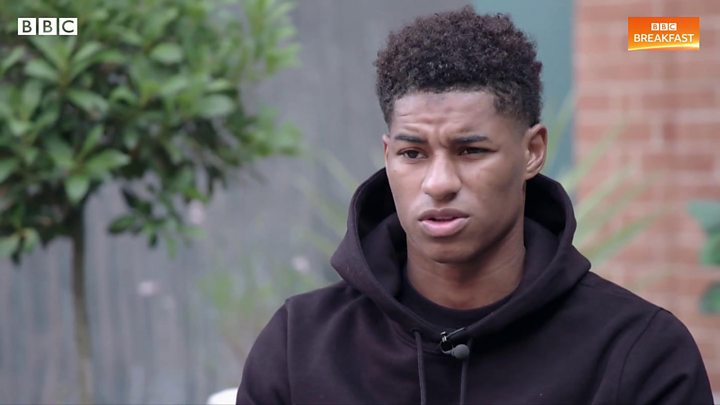Marcus Rashford brings food brand giants together to tackle child food poverty

Media playback is unsupported on your device
Footballer Marcus Rashford has formed a taskforce with some of the UK’s biggest food brands to try to help reduce child food poverty.
The 22-year-old Manchester United forward successfully campaigned to extend free school meals this summer.
He has spoken about his own experiences of using a food voucher scheme as a child and was praised for pressing the government into a U-turn on the issue.
He has written to MPs, outlining the help he feels some families still need.
The group of supermarkets, businesses and charities – including Aldi, Asda, Co-op, Deliveroo, FareShare, Food Foundation, Iceland, Kellogg’s, Lidl, Sainsbury’s, Tesco and Waitrose – have formed a taskforce and backed proposals from the National Food Strategy, an independent review of UK food policy.
Mr Rashford said he was «confident» the group could help change lives «for the better».
Speaking to BBC Breakfast, he said the move to extend free school meals over the summer had been a «short-term solution» to stopping children from going hungry, but it «wasn’t going to work in the long run».
«We had to think about the best way to do it, to think about how these families can eat long term and not have any issues,» he said.
Mr Rashford is hoping that, with a bigger team of experts around him, he might be able to help more children.
«We wanted to do it the best way we could, introduce the best people into our group, and see if using them [we] can push it even more.»
The taskforce is calling for three policy recommendations by the National Food Strategy to be funded by the government as soon as possible:
- Expanding free school meals to every child from a household on Universal Credit or equivalent, reaching an additional 1.5m children aged seven to 16
- Expanding holiday food and activities to support all children on free school meals, reaching an additional 1.1m children
- Increasing the value of the Healthy Start vouchers from £3.10 to £4.25 per week and expanding it to all those on Universal Credit or equivalent, reaching an additional 290,000 children under the age of four and pregnant women
The taskforce says implementing the three recommendations would mark a «unifying step to identifying a long-term solution to child poverty in the UK».
In his letter to MPs, Mr Rashford says he hopes the chancellor will find the funds to do so in his Budget and spending review «without delay».
Schools minister Nick Gibb said he would be delighted to meet Mr Rashford, saying the footballer was «right to draw the nation’s attention» to the matter.
He told BBC Breakfast the government shared Mr Rashford’s objective to alleviate child food poverty and would look at the policy recommendations.
The first report of the National Food Strategy, which was commissioned by the government in 2019, aims to help create a food system in the UK that is healthy, affordable and sustainable.
Food entrepreneur Henry Dimbleby, who is leading the National Food Strategy review, has said school meals are a «fantastic way» to get children eating well at school.
«The alternative to a school lunch is a packed lunch and only 1% of packed lunches have the nutritional value of a school meal,» he said.
«If you look at packed lunches as children get less affluent, those packed lunches have increasingly low nutritional value.»
Speaking on Breakfast, he said nutrition was the basis of equality of opportunity – «you can’t level up if you are not getting enough nutrition into your most vulnerable children».
He added that the status of food, dining halls and particularly school cooks needed to be raised, saying they were «as important as any teacher».
Members of the taskforce have also pledged to spend the next six weeks using their platforms to share stories of those affected by child food insecurity in the UK.
Richard Walker, Iceland’s managing director, said it was an issue they cared about deeply and wanted to support Mr Rashford to effect positive change.
‘Proud and humbled’
Mr Rashford has stressed the importance of tackling the stigma around child food poverty, and changing attitudes about asking for help.
He told the BBC: «I feel like at times people think they are being looked down on if they ask for help, and I think in this generation… that is something that should change.
«You should feel free if you want to ask for help for anything,» he said. «Hold your head up high and if you need help go and get help.»
The footballer has met some of the families who have benefitted from the extended children’s food voucher scheme, which he said had been an «unbelievable experience».
«Just to see the smiles on their faces and to see how much it’s helped them, you know, made me happy,» he said. «It was good to see the parents laughing and smiling.»
During the coronavirus lockdown the government provided vouchers to families whose children qualify for free meals, but it had insisted this would not continue into the summer holidays.
This prompted the England squad footballer to write an open letter to MPs, drawing on his own experiences of relying on free school meals and food banks growing up in Wythenshawe, Manchester. He called on the government to reverse its decision – which it did shortly after he spoke out.
The U-turn enabled about 1.3m children in England to claim vouchers over the holidays, with the support working out as about £15 a week for each child.
- PANORAMA: Home isn’t always a safe place, especially in lockdown
- GOOD TROUBLE: Your new drama obsession – can these girls make it in LA?
Have you used school meal vouchers over the summer? Have you struggled to get access? Please share your experiences by emailing haveyoursay@bbc.co.uk.
Please include a contact number if you are willing to speak to a BBC journalist. You can also get in touch in the following ways:
- WhatsApp: +44 7756 165803
- Tweet: @BBC_HaveYourSay
- Please read our terms & conditions and privacy policy
If you are reading this page and can’t see the form you will need to visit the mobile version of the BBC website to submit your question or comment or you can email us at HaveYourSay@bbc.co.uk. Please include your name, age and location with any submission.


